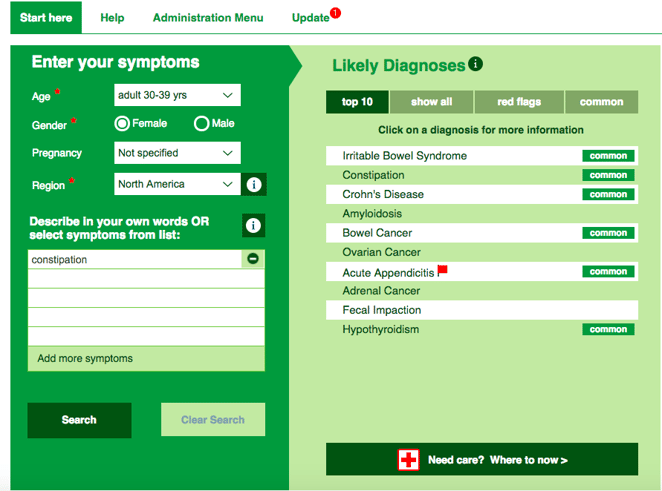- Privacy Policy
- Terms & Conditions
- Contact us
- ©Isabel Healthcare 2020
Could I have constipation? Constipation symptoms and diagnosis
 We’re all familiar with that post-holiday bloated feeling, and given that for many of us, rich foods, sweet puddings, a glass or three of wine and slouching in front of the TV are all part and parcel of the holidays, it’s no surprise that our digestive systems sometimes issue the odd complaint after a week or two of overdoing it. Sometimes that uncomfortable bloated feeling just stays a bit too long and constipation sets in. So how do we know when we need to go to the doctor about it, and when should we be aware that perhaps there’s a bit more going on than just constipation?
We’re all familiar with that post-holiday bloated feeling, and given that for many of us, rich foods, sweet puddings, a glass or three of wine and slouching in front of the TV are all part and parcel of the holidays, it’s no surprise that our digestive systems sometimes issue the odd complaint after a week or two of overdoing it. Sometimes that uncomfortable bloated feeling just stays a bit too long and constipation sets in. So how do we know when we need to go to the doctor about it, and when should we be aware that perhaps there’s a bit more going on than just constipation?
Constipation symptoms
Constipation is the term used when passing a stool becomes more difficult (sometimes painful) and less frequent than usual. It occurs when your stool remain in the colon (or large intestine) for too long, resulting in the colon absorbing too much water from the stool and making them dry, hard and therefore much more difficult to pass. The main reasons more people seem to get it after the holiday period are that our exercise routines are put on hold, and also that we’re probably eating less food which is high in fibre, which helps speed up the stool’s progress through the colon. While everyone’s bowel habits are different, the official diagnosis of constipation is having three or less bowel movements a week. You may also experience the following symptoms:
- Bloating
- Stomach pain
- Nausea
- Loss of appetite
In children the symptoms can vary even more, including irritability, tiredness and lethargy.
Constipation treatments
Making simple changes to your diet and lifestyle should clear up the problem within a few days and help prevent an unnecessary trip to the doctor. The following treatments could help relieve the symptoms.
Increase your fibre intake
Increasing your fibre intake to ideally between 18-30g per day will help promote the movement of your stool through the intestines. Foods rich in fibre include dried fruit, vegetables, wholegrain rice, pasta and bread.
Drink more water
Increasing your water intake will also helps enormously, to help stop the stool drying out in the intestines before you can pass it. If you’re unsure if you are drinking enough water, a good indication is the colour of your urine. It should be pale or clear, and any strong color or odor could be an indication that you are not drinking enough fluids. Cutting back on caffeine, alcohol and fizzy drinks will also help prevent dehydration as these all cause you to urinate more frequently.
Exercise more
This obviously depends on what your current exercise routine entails, but as a minimum, you should be taking 150 minutes of physical activity per week. Having a gentle increase in your exercise routine can kick-start your body into action and help your digestive system to pass the stool it needs to and get back on track.
Don’t hold back
You should never ignore the urge to go to the toilet as this increases the likelihood of developing constipation, and can be a vicious cycle.
Causes of constipation
In addition to a lack of fibre in your diet or lack of exercise, constipation can also be brought on if you’re suffering from depression or anxiety, or if you’re experiencing any psychiatric problems. Certain medications and even vitamin supplements have also been known to cause constipation. With all these particular causes, symptoms will usually ease once the primary issue is resolved, although it should be noted that you must not stop any medication without first consulting your doctor about it. Typical medications which are known to cause constipation include:
- Anti-depressants
- Anti-epileptics (to treat epilepsy)
- Anti-psychotics
- Certain opiate painkillers such as codeine and morphine
- Iron supplements
When should I see a doctor for constipation?
Occasionally constipation can be a sign of a more serious illness or underlying condition. Entering ‘constipation’ as a symptom into the Isabel Symptom Checker reveals a number of conditions which shouldn’t be ignored.

Remember that while you may find it embarrassing discussing your bowel habits with anyone, your doctor probably discusses it every day, so don’t hold back in making an appointment if you are concerned. The longer you leave a problem, the worse it’s likely to get, and if left too long, you run the risk of developing complications such as rectal bleeding and piles or worse. Generally speaking, if your symptoms continue for over a week despite you taking the suggested actions above, seek medical advice. Or, if you are worried about any symptoms you may be experiencing, enter them into the Isabel Symptom Checker and discuss the list with your doctor. You should definitely contact your doctor if you notice any of the following:
- no improvement after changing your diet
- some rectal bleeding
- you are experiencing unexplained weight loss
- you feel constantly tired
If your doctor is confident that you are just experiencing symptoms of classic constipation but lifestyle and dietary changes have not worked, they will most likely prescribe an oral laxative. If your doctor feels you might have Faecal Impaction, a condition when hard, dry stools return back to your rectum, they might carry out a physical examination. In some cases, they may request a blood test to rule out other conditions, or take further tests to determine the cause of your symptoms. If you are concerned about talking to your doctor, we have a page on our website with some useful information on getting the most out of your doctor's appointment which may help.
Subscribe Here!
Recent Posts
Virtual Triage: Do more questions lead to better patient outcomes?
One of the common misconceptions related to virtual triage / symptom checker tools is that the more..Webinar: Using Virtual Triage To Transform Patient Access
Outdated contact centers are posing problems for today's health systems. As longer hold times..List Of Categories
- Differential Diagnosis Decision Support
- Differential diagnosis
- Symptom Checker
- Symptoms
- Medical Error
- Patient Disease Information
- Disease
- Diagnostic Decision Support
- Clinical Decision Support
- Isabel 1 Minute Read
- Diagnosis Error
- Diagnosis Skills Cases
- Healthcare Informatics
- Medical Education
- Patient Engagement
- Clinical Reasoning
- Evidence-based Medicine
- Symptom Triage
- Nurse Practitioner Education
- Nursing Decision Support
- Partnership
- Public Health
- COVID-19
- EHR
- Patient Empowerment
- Patient Safety
- rare disease

Start your FREE Trial today
Try the Isabel Pro DDx generator for 30-days - no payment card details required.




